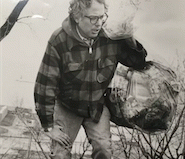My guest today is Brett Mandel, proud Philadelphian, brand-new OpEdNews member and author of My College Professor Won The New Hampshire Primary [2.10.2016].
JB: Welcome to OpEdNews, Brett. You have a very special perspective on the 2016 presidential race. Please tell us a bit about that.
BM: Bernie Sanders was my college professor.
In 1990, in between a failed 1988 run for congress and his successful 1990 campaign, Bernie Sanders taught at Hamilton College in upstate New York. I took his Sociology 335 course -- "The Problems and Potentials of Urban Life." I was a rare urban student at Hamilton and jumped at the chance to take a course that focused on cities taught from the perspective of a former mayor.
As I watch my former professor on the presidential campaign trail, I recall my time with him on College Hill and recently wrote an essay about my recollections. Nearly a quarter-century after taking his class, I am still mindful of his focus on people.
From my former professor, I learned that for government to work best, policies must make sense for real people and I learned that for politics to make sense, elections must be about making real change not just offering positions.

Who said politics isn't dirty? As mayor, Bernie cleans up! Collecting garbage
(Image by University of Vermont) Details DMCA
JB: Let's talk more specifically. As a proud Philadelphian, you brought up in class the example of the Pennsylvania Convention Center. Bernie did not share your enthusiasm. Why not?
BM: When I was in college, Philadelphia was -- as derided by a Philadelphia Magazine headline -- "a city on its ass." Just before I left for college, the city infamously bombed a home inhabited by a radical group, killing many and then allowing the resulting firestorm to destroy an entire neighborhood. The city was at the tail-end of an exodus that reduced city population and jobs by more than one quarter. Abandonment, decay, and blight threatened neighborhoods and the Center City central business district. While I was in college, the city finances were so compromised that Philadelphia was flirting with municipal bankruptcy.
This was the Philadelphia of "Rocky" not "The Philadelphia Story." It was a mess.
But, one bright hope for the city -- or so it seemed to me -- was the creation of the Pennsylvania Convention Center. It was a huge project, converting two inner-city blocks on the fringes of Center City into a state-of-the-art meeting space in an effort to grow the hospitality industry and put Philadelphia on the map as a convention town.
It seemed like an incredibly positive project that would generate construction jobs in the short term, grow hospitality jobs in the long term, and transform a beaten-up area into a desirable destination.
Sanders listened to me gush about the project as a positive sign that Philadelphia was rebounding from its troubles, but cautioned me that it was a YUGE (as he would say) expenditure of public money that would destroy a once-vibrant neighborhood, create low-wage jobs, and only benefit the out-of-town hotel owners.
At the time, I convinced myself that Sanders was wrong and that THIS Convention Center project was a worthy one. Years later, as the Director of Financial and Policy Analysis for the City Controller's Office, I crunched some of the numbers and found that, not only were the revenues associated with the new Convention Center insufficient to cover the debt service associated with the Center's construction, but the Center's construction itself was insufficient to grow hospitality jobs. Hotel after hotel applied for additional subsidies in the form of Tax-Increment Financing from the city, denying Philadelphia the tax revenues that were supposed to flow from the creation of the Center.
(Note: You can view every article as one long page if you sign up as an Advocate Member, or higher).






